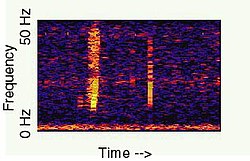
Bloop was an ultra-low-frequency, high amplitude underwater sound detected by the U.S. National Oceanic and Atmospheric Administration (NOAA) in 1997.[1] By 2012, earlier speculation that the sound originated from a marine animal[2] was replaced by NOAA's description of the sound as being consistent with noises generated via non-tectonic cryoseisms originating from glacial movements such as ice calving, or through seabed gouging by ice.[1][3][4]
- ^ a b "Acoustics Monitoring Program – Icequakes (Bloop)". NOAA Pacific Marine Environmental Laboratory. National Oceanic and Atmospheric Administration / United States Department of Commerce. Archived from the original on February 25, 2020. Retrieved August 28, 2017.
- ^ David Wolman (June 15, 2002). "Calls from the deep". New Scientist. Archived from the original on January 6, 2013. Retrieved January 16, 2012.
- ^ Steadman, Ian (November 29, 2012). "The Bloop Mystery Has Been Solved: It Was Never A Giant Sea Monster". WIRED UK. Conde Nast Publications.
- ^ US Department of Commerce, National Oceanic and Atmospheric Administration (June 25, 2018). "What is the Bloop?". oceanservice.noaa.gov. Archived from the original on May 7, 2019.